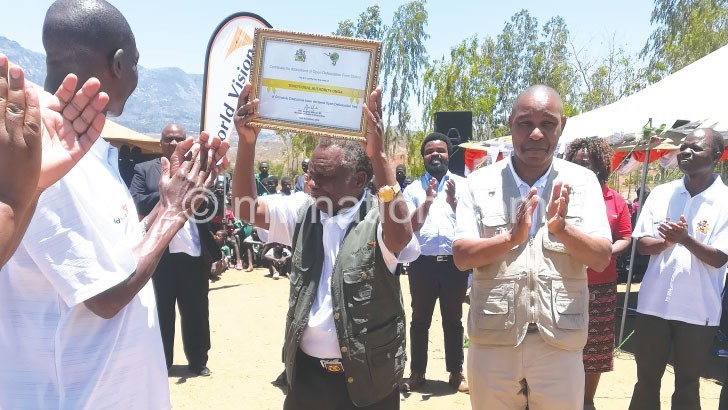Towards zero open defaecation
As Malawi joins the world today in commemorating World Toilet Day, our reporter ALBERT SHARRA, analyses Malawi’s performance in achieving zero open defaecation.
On this Monday afternoon, the sun was overhead and the atmosphere was dusty, but life at Mbombwe Primary School in Chiradzulu was just electric.
Joyful faces were all over. It was a historical moment. For the first time in a long time, villagers in Sub-Traditional Authority (Sub-T/A) Onga were declaring their triumphant victory over open defaecation.

With a glittering smile, Sub-T/A Onga, clad in a black shoe, a pair of trousers, white golf shirt and a waistcoat, spent over 20 minutes walking around the school ground with his hands holding an Open Defaecation Free (ODF) certificate up, displaying it to scores of his subjects, who had turned up to celebrate the feat. And the handclaps that adorned the moment cheerfully confirmed a sense of conquest in the community.
“For three years now, we have not registered any cholera or diarrhoeal case,” said the chief cheerfully.
Just six years ago, every rainy season meant more cholera and diarrhoeal cases. health surveillance assistant (HSA) for Sub-T/A Onga, Kenneth Kiyare, says cholera and diarrhoeal cases were around 15 and 30 percent, respectively.
He says for the past three years, the community has not registered any waterborne disease. The community’s success dates back to six years ago following the launch of the community-led total sanitation (CLTS), a government water and sanitation (Wash) initiative.
CLTS is an innovative methodology through which communities are mobilised to eliminate open defaecation. It combines behavioural change with appropriate local solutions, including latrine construction, to create a culture of good sanitation.
The approach was first adopted around 2008 to complement government’s efforts in meeting the 2015 targets of the now phased-out Millennium Development Goals (MDGs).
In 2010, according to Unicef, while 81 percent of schools in Malawi had access to protected water sources, only 23 percent had acceptable sanitation. The sanitation, which includes open defaection, coverage was only 65.4 percent. Water Aid says 9.6 million people in Malawi do not have a decent toilet.
Government adopted CLTS to scale up Wash services at community level. It partnered different institutions, including Unicef, Plan Malawi and Engineers without Borders. More focus was on improving hygiene through access to water and eradicating open defecation.
Kiyare says his community was among the first that responded to CLTS concept quickly. He says HSAs and chiefs started to meet and conduct sensitisation campaigns. This, he says, helped the community to appreciate its Wash problems and develop an interest to act.
“We have made good progress since 2015 after World Vision introduced Wash projects in our community,” he reveals. “They did not bring ideas, but they supported us to construct toilets with a strong roof, floor, wall and a lid plus a water facility outside the toilet.”
During our visit to Nayelo Village, we found a toilet and water facilities at every household. All facilities are made from locally available resources.
Two years after launching CLTS, government declared 53 villages ODF. More than 25 000 people gained access to adequate sanitation with other 321 villages working towards the goal.
Today, according to World Vision communications officer Charles Kabena, 101 T/As out of the 263 T/As have been declared ODF. This represents 38 percent. So far, only two of the 28 districts-Balaka and Ntchisi have achieved ODF status.
Although chief director in the Ministry of Health Beston Chisamile says Nkhotakota and Rumphi have also achieved the feat pending final assessment, the figures cast doubt that government will achieve a national ODF status by 2019 as planned.
“The progress is good, but we are concerned with the few households living without toilets. To achieve ODF every household needs to subscribe to the campaign and own a toilet,” says Chisamile.
Kiyare reveals that despite Onga achieving ODF status, there are some people in the community who are still living without a toilet.
But World Vision director of programme, Charles Chimombo, whose institution is among the core partners of government in Wash initiatives, is optimistic.
“ODF is achievable and the progress made so far is encouraging. We just need to continue with behavioural change campaigns in areas declared ODF to ensure we do not move back,” he says.
Chimombo says by having ODF communities now, it means Malawi is on track to achieve global goals because the target is 2030. He says what is needed is an extra gear to reach the remaining communities.
Goal six of the Sustainable Development Goals (SDGs) urges nations to ensure there is universal and equitable access to safe and affordable drinking water for all. The second core target under the goal is to ensure each country achieves access to adequate and equitable sanitation and hygiene for all. This includes ending open defaecation.
The CLTS approach adopted to achieve ODF is viable. However, as the 2019 ODF deadline draws closer, Malawi needs more than rhetoric in Wash projects if it is to reach the remaining 160 T/As still practising open defaecation. n





